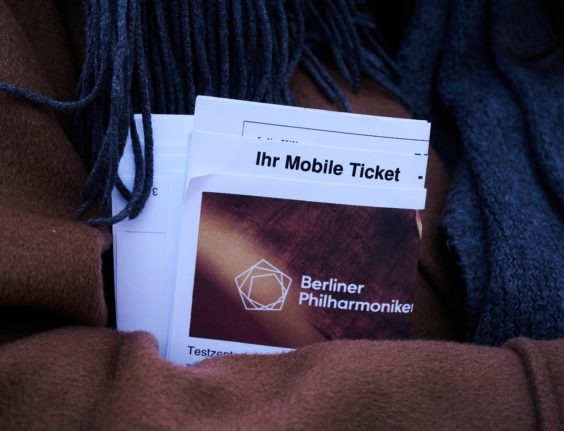As the world-famous Berlin Philharmonic under its chief conductor Kirill Petrenko struck the final chords of Sergei Rachmaninov's Second Symphony on Saturday evening, the audience rose to its feet to give it a long and rapturous standing ovation.
"Attending a real concert changes everything," said one audience member, Peter, in his thirties. "I have been watching concerts on video but that's nothing compared to this."
For violinist Aleksandar Ivic, too, the return to stage before a crowd has been nothing less than emotional.
"For months, we have been playing without an audience, which is still better than nothing. But the spectators make the difference between 2D and 3D," he told AFP.
It is "us plus the public that can bring us to a state that we cannot achieve by playing alone," he said.
Silenced
As in other countries around the world, Germany's cultural scene has been devastated by repeated shutdowns aimed at stemming the spread of the virus.
Some opera houses and symphony orchestras improvised during the summer, taking advantage of the good weather to bring performances outdoors including to backyards of private residences, or to smaller audiences.
But after a limited restart in the autumn when set numbers of spectators were allowed indoors again, concert halls and theatres were shut once more from November.
Some shops were allowed to reopen in March following the latest shutdown in December, nurturing hopes that cultural facilities might be able to welcome live audiences again.
But infection numbers have since risen, and are now surging at an exponential rate.
READ ALSO: The show must go on: How German orchestras are continuing concerts amid the pandemic
Chancellor Angela Merkel, who is meeting regional leaders of Germany's 16 states later Monday to decide new measures to contain the virus, has warned that a shutdown will have to be tightened again.
With Germany's inoculation campaign also progressing at a sluggish pace, the country is poised for further restrictions into April.
Despite the dismal prospects, the Berlin Philharmonic's general manager Andrea Zietschmann said her institution had joined in Berlin authorities' pilot project to find a way for the culture sector to operate despite the pandemic.
Just ahead of the concert, Zietschman went on stage to voice her and "the musicians' emotions" at greeting a crowd again.
Tests, masks, distance
At the Philharmonic's concert, strict rules were in place to reduce the risk of contagion.
Spectators were required to give their names when purchasing the tickets, which were not transferable.
They were then mandated to get a free test on the day of the concert in one of five centres cooperating with the Philharmonic or at the concert hall itself.
 A mobile ticket which guests carried with them to the event. Photo: DPA
A mobile ticket which guests carried with them to the event. Photo: DPAMedical staff in protective suits were at hand to administer the swabs.
Those testing positive would have their tickets reimbursed, although no one had to be turned away from Saturday's concert.
During the show, it was masks on for all spectators.
Every next seat was left unoccupied.
To limit movements around the hall, no refreshments were sold, and no coat check service offered.
The site was also regularly disinfected and aerated with a specialised air-conditioning system.
Musicians sat a metre (three feet) apart, except for wind players, who were at 1.5 metres apart.
In all, about a dozen concert halls and theatres joined in the pilot project.
The Berliner Ensemble, a theatre company founded by Bertolt Brecht, put up its first show in months with an audience on Friday evening before several hundred people.
"What is important is that culture is put back on the rails. In Spain, in Poland, in Luxembourg, there is theatre, opera," said Berliner Ensemble director Oliver Reese.
"We are in mid-March and we still have no idea what will happen in April or May. We cannot bear that," he said.

Comments (1)